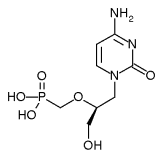In this case report, four patients are described with basal cell carcinomas (BCC) treated with 1% topical cidofovir. Cidofovir is a purine nucleotide analog, effective against a wide number of DNA viruses. However, this drug may also have antineoplastic properties, presumably through the induction of apoptosis and inhibition of angiogenesis. Although surgical excision is traditionally the treatment of choice in patients presenting with basal cell carcinomas, this option may not be amenable to all patients for a variety of reasons. Four patients are described who refused surgery for their basal cell carcinomas. Two of the patients had lesions on their faces, one had a large (10 x 14 mm) BCC on the side of his head, and one patient had a BCC on her sternum. 1% cidofovir was applied daily for 10 days, then every other day for another 50 days. All patients experienced local reactions at the site of application: erythema, itching, and erosion. All patients achieved complete clinical regression (up to 24 months) of their BCC after treatment. Three of the patients underwent biopsies which showed histopathologic clearing 3 months after the end of therapy. The patient with the large lesion on the side of his head subsequently underwent complete excision (despite clinical clearance) and the histopathology showed tumor cells with numerous apoptotic bodies and an intense lymphocytic infiltrate. The authors point out that although the number of patients treated was small, this experience shows the potential effectiveness of 1% cidofovir in the non-surgical treatment of BCCs.
Donato Calista. Topical 1% Cidofovir for the Treatment of Basal Cell Carcinoma. European Journal of Dermatology 2002; 12:562-4.
COPYRIGHT 2003 Journal of Drugs in Dermatology
COPYRIGHT 2003 Gale Group



